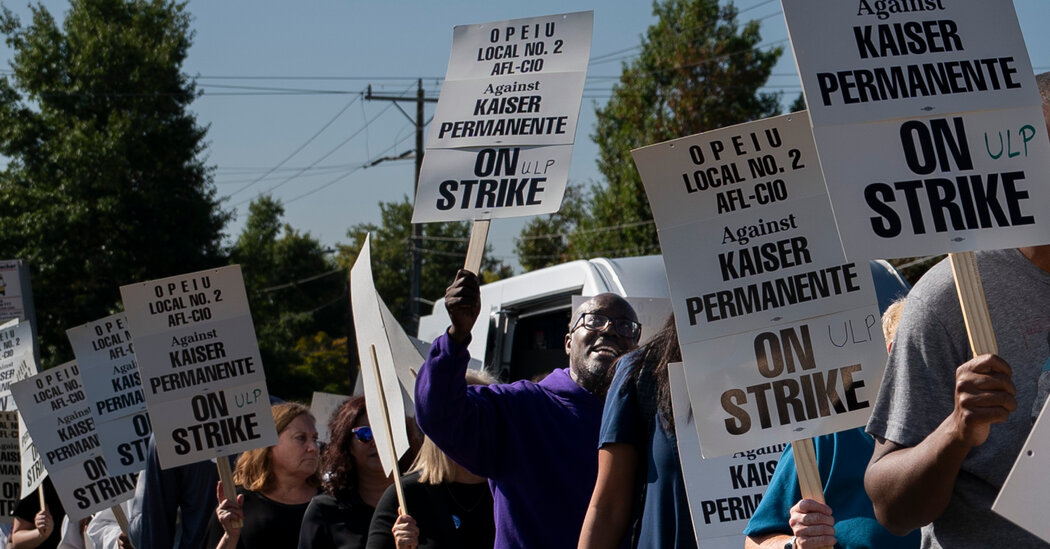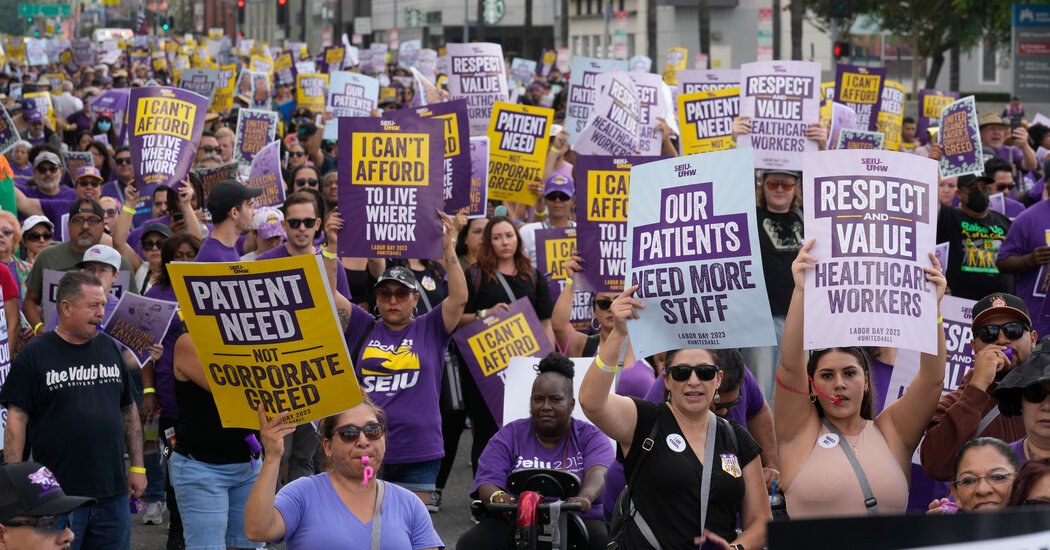Kaiser Permanente Reaches Tentative Deal With Health Care Workers
The proposed settlement follows a three-day strike involving thousands of unionized workers in several states.Kaiser Permanente reached a tentative deal with more than 75,000 of its health care workers on Friday, one week after a three-day walkout that disrupted appointments and services at many hospitals and clinics, according to an announcement by union officials.The labor dispute was the latest in a series between health care organizations and their employees, many of whom reported feeling exhausted and frustrated by severe staffing shortages after the pandemic.“The frontline health care workers of the Coalition of Kaiser Permanente Unions are excited to have reached a tentative agreement with Kaiser Permanente. We are thankful for the instrumental support of acting U.S. Labor Secretary Julie Su,” union officials announced on X, the site formerly known as Twitter.Kaiser Permanente officials did not immediately respond to a request for comment.More details were expected later on Friday. The deal was earlier reported by The Wall Street Journal.Kaiser Permanente health plans cover 13 million people in eight states through its own network of hospitals and doctors.A week ago, various low-wage workers took part in a 72-hour strike. The employees included medical assistants, laboratory technicians, receptionists and sanitation staff members who formed picket lines around dozens of Kaiser buildings, waving signs that demanded, “Kaiser: Put Patients First” and “Respect And Value Healthcare Workers.”The work stoppage forced Kaiser to move many appointments online and to postpone procedures that weren’t considered urgent, like colonoscopies or mammograms. The company brought contingency workers into hospitals and urgency care centers, but more than 50 labs in Southern California were shut down, and dozens of other facilities throughout the West Coast either closed or limited their hours. Union leaders called it the largest strike by health care workers in recent U.S. history.Kaiser’s stalemate drew the attention of Ms. Su, the Biden administration’s acting secretary of labor, who traveled to San Francisco to meet with officials from both sides of the negotiations, aiming to help broker a deal. Still, the parties did not return to the negotiation table for over a week after the strike began and talks broke off; the labor coalition threatened another walkout — this one to last a full week — in early November if the two sides could not settle a contract beforehand.Kaiser’s new deal comes at pivotal moment in the health labor market, after a significant exodus of staff members throughout the industry has left the supply of workers far below the demand. The dynamic has created a sense of urgency for both sides: Workers trying to treat patients amid staffing shortages report record levels of burnout, while their employers are under pressure to preserve their workforces and offer packages that attract new workers.Analysts say the situation has most likely provided union workers with leverage to get more at the table, and many are seizing the opportunity. More than a dozen health worker strikes have taken place this year in New York City, California, Illinois, Michigan and elsewhere.About 1,500 health workers began a five-day strike against Prime’s St. Francis Medical Center in Lynwood, Calif., on Oct. 9, citing dangerous short-staffing practices. Pharmacy staff workers at some Walgreens stores in Oregon, Washington, Arizona and Massachusetts walked out on the same day, citing workloads so excessive that they could not safely fill prescriptions. Without a formal union, they organized on Facebook and Reddit.The New York State Nurses Association entered a new contract with Mount Sinai Hospital, which includes an enforcement mechanism for nurse-patient staffing ratios.But companies like Kaiser are under pressure to limit their expenses, and the organization emphasizes that it needs to make sure its care is affordable. The organization, which had operating revenue of $95.4 billion, reported an operating loss of $1.3 billion in 2022. In recent months, Kaiser has returned to profitability.
Read more →


